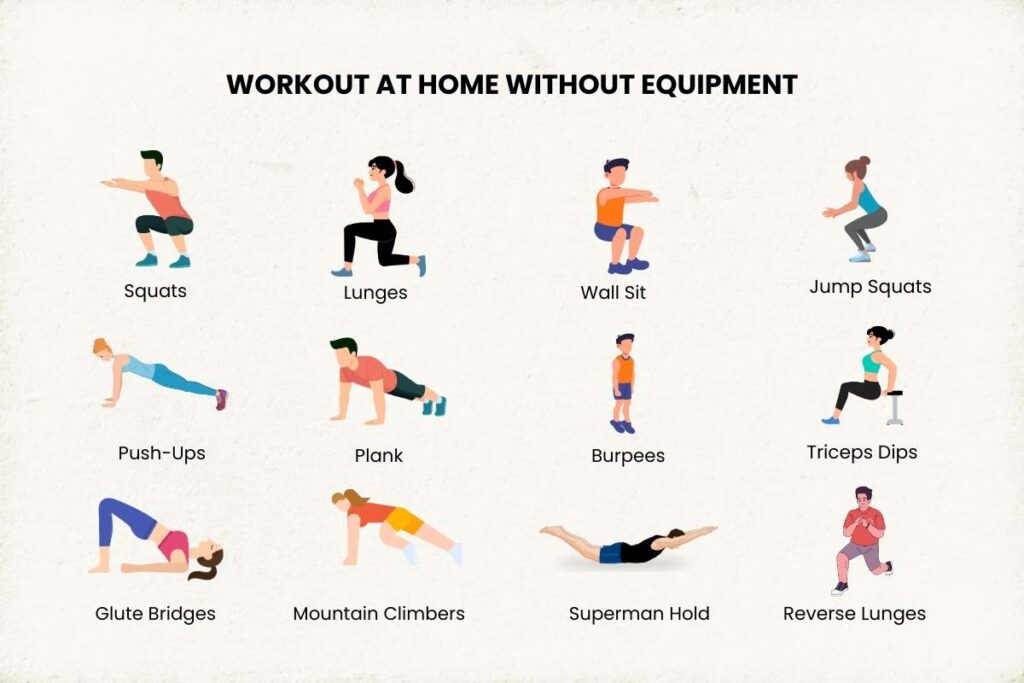Home Workouts Without Equipment: A Complete 2025 Guide

Why Bodyweight Workouts Work
You don’t need fancy gym equipment to build strength, stay healthy, or lose fat. Bodyweight workouts challenge your muscles, raise your heart rate, and help you improve mobility, all within the comfort of your own space. They allow flexibility, cost nothing, and can be scaled up as you get stronger.
Key Principles for Effective Home Workouts
1. Compound Movements
Focus on exercises that work multiple muscle groups at once, like squats, push-ups, and lunges. These give you more bang for your time and boost calorie burn.
2. Proper Form
If your form is off, you’re risking injury. Take the time to learn how to perform each movement well. Use mirrors, video yourself, or follow coached tutorials online.
3. Progressive Overload
To get stronger or leaner, you need to increase your challenge over time. That could mean more reps, shorter rest, or harder variations like jump squats instead of bodyweight squats.
4. Structured Routine
Even with bodyweight, having a plan helps you stay consistent. We’ve included a 4-week plan below so you can build strength, confidence, and results.
5. Warm-Up and Cool-Down
A 5-minute warm-up (rocking, hip circles, arm swings) and 5-minute cool-down (stretching, deep breathing) reduce soreness and boost recovery.
Full-Body Home Workout Routine
Here are five essential bodyweight exercises, suitable for all fitness levels:
Push-Ups
Targets your chest, shoulders, triceps, and core.
- Beginners: incline push-ups (hands on wall or bench)
- Intermediate: standard push-ups
- Advanced: decline or one-arm push-ups
Squats
Works quads, hamstrings, glutes, and core.
- Beginners: steady bodyweight
- Intermediate: slower reps or pause at the bottom
- Advanced: jump squats or pistol squats
Lunges
Strengthens glutes, quads, hamstrings, and improves balance.
- Keep torso upright, step forward or backward.
- Advanced: dynamic jump lunges or walking lunges.
Plank
Core staple for abs, back, hips, and shoulders.
- Beginners: hold for 20 seconds
- Intermediate: aim for 45–60 seconds
- Advanced: side planks, plank with arm/leg raises
Glute Bridges
Works the posterior chain, glutes, hamstrings, lower back.
- Beginners: basic bridge
- Intermediate: single-leg bridge
- Advanced: bridge hold with hip lift pulse or march
Sample 4-Week Home Workout Plan
This plan builds gradually and gives your body time to adapt.
Week 1 – Foundation
- Day 1:
• 3 x 8 push-ups
• 3 x 12 squats
• 3 x 10 lunges (each leg)
• 3 x 20-sec plank
• 3 x 12 glute bridges
- Day 2: Active Rest (restorative yoga, walking)
- Day 3: Repeat Day 1 routine
- Day 4: Active Rest
- Day 5: Repeat Day 1 routine
- Days 6–7: Rest or active recovery
Week 2 – Add Volume
- Increase to 3 x 10 push-ups, 15 squats
- Hold 30-sec planks
- Try single-leg bridges or pulses
Week 3 – Introduce Intensity
- Add more reps (3 x 12), or switch to more challenging push-up/squat variations
- Perform lunges walking or faster tempo
- Add side planks or leg lift variations
Week 4 – Challenge and Mix it Up
- Booster workout: circuit-style, minimal rest, 4 sets
- Combine exercises: superset squats then push-ups
- Add 1-minute cardio bursts (high knees, jump jacks)
Exercise Progressions (No Equipment Needed)
| Exercise | Beginner → Intermediate → Advanced |
|----------------|-----------------------------------------------------------|
| Push-ups | Hands on bench → Standard → Feet elevated → Decline |
| Squats | Bodyweight → Paused → Jump squats → Pistol squats |
| Lunges | Stationary → Walking → Jump lunges → Bulgarian split squats |
| Plank | Hold 20 sec → 45 sec → Side plank → Dynamic plank |
| Glute Bridge | Basic → Single-leg → Glute bridge march |
Add-On Moves for Variety
Once the basics feel easy, try these bodyweight options:
- Burpees (full-body cardio strength combo)
- Mountain climbers (core plus heart rate)
- Inchworm to push-up (mobility + strength)
- Superman holds (glutes and lower back)
- Bear crawls or crab walks (full-body dynamic stability)
Benefits Beyond Strength
- Fat Loss & Cardiovascular Health
Compound bodyweight moves combined with cardio snippets help burn calories and strengthen your heart.
- Mobility & Balance
Lunges, planks, and burpees build flexibility, core control, and coordination.
- Mental Strength
Completing workouts at home improves discipline, confidence, and stress relief.
- Sustainable Fitness
Adaptable programming means these workouts grow with you, no plateau or gym needed.
Tips to Stay Consistent
- Schedule workouts like appointments, set reminders.
- Track progress: note reps, time held, or exercise variations.
- Switch it up every 4–6 weeks to avoid boredom.
- Create a space: even a small corner with enough floor space works great.
- Wear good gear: supportive shoes and breathable clothing make workouts more comfortable.
Sample Weekly Schedule
| Day | Focus |
|--------------|-------------------------------------|
| Monday | Strength Workout |
| Tuesday | Active Recovery (walk, yoga) |
| Wednesday | Strength Workout + Cardio Burst |
| Thursday | Core & Mobility Focus |
| Friday | Full-Body Circuit Workout |
| Saturday | Fun Activity (bike, hike) |
| Sunday | Rest and Stretch |
Final Thoughts
You don’t need a gym or gadgets to build a strong, fit body. With bodyweight routines, consistency, and progressive effort, you can lose fat, tone muscle, and feel better than ever from the comfort of home. Use the 4-week plan as a foundation, refine your form, and adjust as you grow. The most effective tools? Determination and daily movement.
Ready to challenge yourself? Start today, this could be your strongest, healthiest version yet.